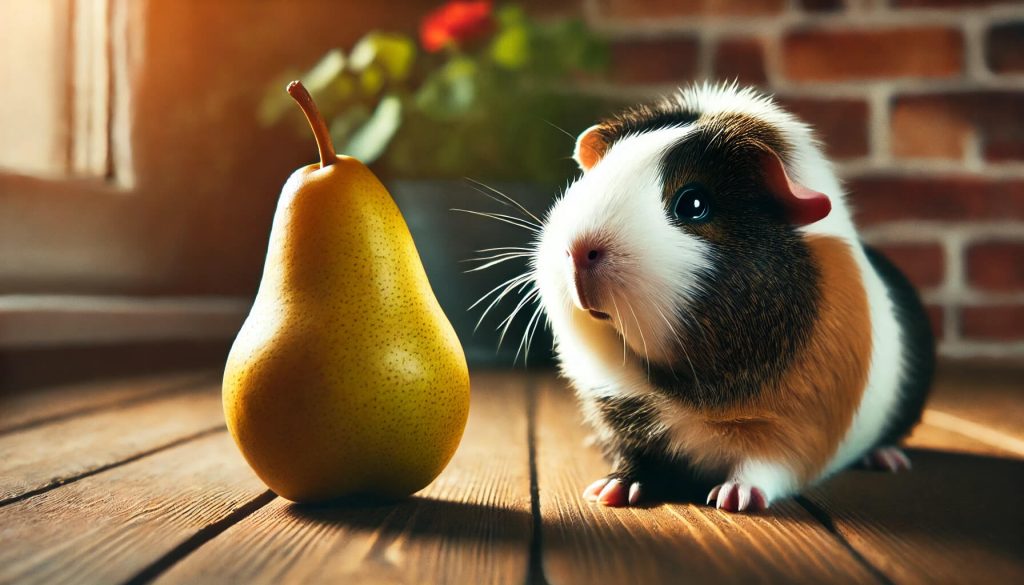
Can Guinea Pigs Eat Pear?
Nutritional Value of Pears for Guinea Pigs
Pears offer several nutritional benefits for guinea pigs, but it’s essential to understand their detailed components to make informed decisions.
Vitamins and Minerals in Pears
Pears contain several vitamins and minerals beneficial for guinea pigs. Vitamin C is crucial, as guinea pigs can’t produce it naturally. One pear provides about 7 mg of Vitamin C. Pears also have Vitamin K, which supports blood health. The mineral content includes potassium, which aids muscle function, and small amounts of calcium and iron. These nutrients contribute to overall health but should be balanced with other foods.
Sugar and Fiber Content
Pears have both sugar and fiber elements important for guinea pigs. On average, one pear contains 15 grams of sugar, which is relatively high. Excessive sugar can lead to obesity and dental issues in guinea pigs, so moderation is key. On the positive side, pears offer fiber that supports digestive health. They contain around 3 grams of fiber per pear, aiding in gut motility and preventing constipation when given in suitable amounts.
Risks of Feeding Pears to Guinea Pigs
Feeding pears to guinea pigs poses several risks that pet owners need to consider. Though pears have nutritional benefits, it’s crucial to be aware of the dangers involved.
The Danger of Pesticides and How to Avoid Them
Pears often carry pesticide residues that can harm guinea pigs. Pesticides used in commercial farming leave residues on fruit skins. Thoroughly wash pears under running water before feeding them to your guinea pigs. Opt for organic pears to minimize pesticide exposure. Scrubbing the fruit gently can help remove surface residues, making the pears safer for your pets.
Potential Digestive Issues
High sugar content in pears can lead to digestive problems for guinea pigs. Excessive sugar intake disrupts the natural balance of gut bacteria, causing diarrhea and other digestive disturbances. Introduce pears in small amounts, monitoring for any signs of gastrointestinal upset. Observe your guinea pig’s stool consistency and overall behavior after feeding pears. Only offer pears occasionally to prevent long-term health issues related to sugar consumption.
Feeding Guidelines for Pears
Guinea pigs can enjoy pears as a treat in moderation. Follow these guidelines to ensure their safety and health.
How Often Should Guinea Pigs Eat Pears
Limit pear consumption to 1-2 times per week. Too much can lead to digestive issues and obesity due to high sugar content. Always balance pear treats with regular servings of hay, fresh vegetables, and pellets.
Proper Preparation and Serving Sizes
Wash pears thoroughly to remove pesticide residues. Organic pears are preferable but not mandatory. Remove seeds and core to prevent choking hazards. Cut pears into tiny pieces, roughly the size of your guinea pig’s paw. Offer no more than one teaspoon-sized serving per session to control sugar intake and minimize health risks.
Alternative Safe Fruits for Guinea Pigs
Guinea pigs can enjoy various fruits that add nutritional value and variety to their diet while keeping them safe. These fruits offer essential vitamins, minerals, and fiber, enhancing their overall health.
Apples
Apples are a good source of vitamins A and C. Serve them in small, peeled pieces, and avoid seeds and cores.
Blueberries
Blueberries contain antioxidants beneficial for guinea pigs. Offer a few berries (2-3) once a week.
Strawberries
Strawberries, rich in vitamin C, support immune health. Remove the tops, and provide 1-2 small pieces weekly.
Oranges
Oranges provide an excellent source of vitamin C. Remove the peel and seeds, and offer a small segment once or twice a week.
Kiwi
Kiwi, packed with vitamin C and fiber, helps in digestion. Peel off the skin, and serve a small slice (1-2 times weekly).
Melon
Melons (e.g., cantaloupe, watermelon) provide hydration and vitamins A and C. Remove seeds and rind, giving small cubes occasionally.
Papaya
Papaya carries vitamins C and E. Serve small, seedless pieces occasionally for added nutritional benefits.
Grapes
Grapes are high in natural sugars but can be given sparingly. Offer 1-2 grapes, removing seeds and slicing for safety.
Ensure all fruits are fresh, properly washed, and served in moderation to prevent digestive issues from excessive sugar intake. Balanced feeding with a primary diet of hay, vegetables, and pellets are essential for maintaining your guinea pig’s health.
Conclusion
Feeding pears to your guinea pig can be beneficial in moderation due to their vitamins and fiber. However, be mindful of the high sugar content and potential pesticide residues. Always wash and prepare fruits properly before serving. Remember, a balanced diet with hay, vegetables, and pellets are crucial for your guinea pig’s overall health. Consider offering a variety of safe fruits like apples and strawberries to keep their diet nutritious and interesting.
